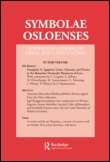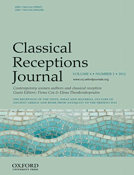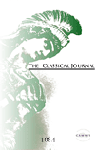
Myrtia
Scope & Guideline
Fostering discussions that shape tomorrow's ecosystems.
Introduction
Aims and Scopes
- Classical Textual Analysis:
The journal emphasizes in-depth analysis and interpretation of classical texts, including works from Greek and Latin literature, exploring their historical context and literary significance. - Cultural and Historical Contextualization:
Contributions often situate classical works within their historical and cultural contexts, examining how these texts have influenced or reflected societal values and beliefs throughout history. - Interdisciplinary Approaches:
Myrtia encourages interdisciplinary research that combines literature with other fields such as history, philosophy, linguistics, and cultural studies, reflecting the multifaceted nature of classical studies. - Translation and Commentary:
The journal features articles that provide new translations and commentaries on classical works, making them accessible to a broader audience and facilitating deeper understanding. - Exploration of Classical Reception:
There is a consistent focus on how classical texts have been received and interpreted over time, including their influence on later literature, art, and philosophy.
Trending and Emerging
- Cultural Interactions and Identity:
A growing number of articles explore themes of cultural interactions, identity formation, and the dynamics of power in ancient texts, reflecting contemporary discussions on multiculturalism and identity. - Gender Studies in Classical Literature:
There is an increasing focus on gender studies, analyzing the roles and representations of women in classical texts, which aligns with broader societal conversations about gender and representation. - Digital Humanities and Classical Studies:
Emerging scholarship is beginning to incorporate digital humanities methodologies, utilizing technology to analyze classical texts and their contexts, which opens new avenues for research and collaboration. - Environmental and Ecological Perspectives:
Some recent papers have started to examine classical literature through environmental lenses, discussing themes of nature, ecology, and human interaction with the environment in ancient texts. - Classical Influence on Modern Thought:
There is an uptick in research examining how classical texts inform modern philosophical and ethical debates, emphasizing the relevance of ancient wisdom in contemporary discourse.
Declining or Waning
- Traditional Philological Methods:
There has been a noticeable decrease in the publication of papers solely focused on traditional philological analyses, suggesting a shift towards more interdisciplinary approaches that engage with broader cultural and historical contexts. - Narrow Regional Studies:
Research concentrating on specific geographical areas or lesser-known texts of the classical world is appearing less frequently, possibly as scholars increasingly favor broader thematic or comparative studies. - Historical Linguistics:
There is a decline in papers focused specifically on historical linguistics of classical languages, indicating that scholars may be prioritizing literary or cultural analyses over linguistic studies.
Similar Journals

Eikasmos-Quaderni Bolognesi di Filologia Classica
Bridging the Past and Present Through LanguageEikasmos-Quaderni Bolognesi di Filologia Classica is a distinguished journal that focuses on the fields of Classics, Linguistics, and Language, published by PATRON EDITORE S R L in Italy. With its ISSN 1121-8819, the journal has been a vital platform for the dissemination of scholarly work from 2011 until 2021, contributing significantly to the dialogue within these disciplines. Although recognized in the lower quartiles (Q4) of various categories within Scopus, including Classics and Linguistics, and having ranked in the 37th and 19th percentiles respectively, Eikasmos stands as an invaluable resource for researchers, academics, and students committed to exploring classical philology and its interconnections with modern linguistic studies. The absence of an open access model underscores the importance of institutional support in accessing this scholarly work, which continues to enrich the academic landscape of classical studies.

Eirene-Studia Graeca et Latina
Illuminating the Classics for Today's ScholarsEirene-Studia Graeca et Latina, ISSN 0046-1628, is a prominent academic journal published by the Institute of Classical Studies, Academy of Sciences of the Czech Republic. Focusing on the fields of Classics, Linguistics, and Archaeology, this journal serves as a vital platform for scholarly discourse and research dissemination since its inception in 2002. Although it operates under a traditional access model, the journal has established itself within the academic community, evidenced by its placement in the Q4 category across multiple disciplines in 2023. This includes significant rankings in areas such as Archaeology and Language and Linguistics, where it finds itself within the 27th to 16th percentiles of its respective categories. Eirene aims to foster the advancement of research in the Humanities, providing a rigorous forum for scholars and practitioners interested in classical studies. Its contribution to the academic landscape is essential for those who aspire to explore the depths of ancient languages, cultures, and methodologies, making it a valuable resource for researchers, professionals, and students alike.

Symbolae Osloenses
Connecting Scholars Through Timeless InsightsSymbolae Osloenses, published by TAYLOR & FRANCIS LTD, is a distinguished journal in the field of Classics, with a rich history dating back to its inception in 1922. This UK-based journal has continuously contributed to the scholarly discourse surrounding ancient cultures, languages, and literature, making it a crucial resource for researchers, educators, and students alike. Though it operates under a subscription model, its impact on the academic community is underscored by its recent inclusion in the 2023 Scopus rankings, where it holds a respectable position in the 65th percentile among its peers. With decades of published research spanning from 1924 to 2023, Symbolae Osloenses remains committed to fostering robust academic dialogue and advancing knowledge in the Classics, catering to a diverse readership seeking to explore the nuances of classical studies.

RAMUS-CRITICAL STUDIES IN GREEK AND ROMAN LITERATURE
Navigating the Depths of Ancient Literary HeritageRAMUS: Critical Studies in Greek and Roman Literature, published by Cambridge University Press, stands as a premier journal dedicated to the exploration and analysis of classical literary texts. Established in 2002, this journal has garnered recognition in its field, achieving a Q1 category ranking in both Classics and Literature and Literary Theory for 2023, which reflects its commitment to scholarly excellence. With an impressive Scopus ranking, where it places in the 76th percentile for Literature and Literary Theory and the 70th percentile for Classics, RAMUS is a critical resource for researchers, professionals, and students engaged in the study of ancient texts and their lasting impact on contemporary literature. Although currently not an open-access journal, it offers a wealth of peer-reviewed articles, reviews, and critical essays that enrich understanding and foster discussions in the realms of Greek and Roman literary traditions. This journal not only serves as an academic platform but also contributes to the ongoing dialogue on the relevance of classical literature in today's cultural and literary discourse.

Classical Receptions Journal
Connecting Ancient Voices to Modern NarrativesClassical Receptions Journal, published by Oxford University Press, is a leading scholarly periodical that engages with the intersection of classical studies and contemporary culture. With its ISSN 1759-5134 and E-ISSN 1759-5142, the journal has established itself as a notable platform for innovative research that examines how classical texts, themes, and ideas continue to resonate in modern contexts. With a scope that includes the realms of Arts and Humanities, Classics, and Cultural Studies, this journal is ranked in the Q2 category for Classics and Q3 for both Arts and Humanities and Cultural Studies, demonstrating its significant impact in the field. Researchers and students will find a wealth of peer-reviewed articles that not only explore historical reception but also inspire new conversations and methodologies. The journal's commitment to publishing quality scholarship makes it an essential resource for anyone interested in the ongoing relevance of classical antiquity in today’s world, from its home base in the United Kingdom at Great Clarendon St, Oxford.

CLASSICAL JOURNAL
Unveiling the Rich Tapestry of Classical ThoughtCLASSICAL JOURNAL, published by the esteemed Johns Hopkins University Press, stands as a premier academic platform dedicated to the exploration and analysis of classical studies, focusing on ancient Greek and Roman literature, history, and culture. With an impressive impact factor and categorized in the Q1 quartile for Classics in 2023, the journal provides high-quality, peer-reviewed articles that contribute significantly to our understanding of classical antiquity. Researchers and students from around the globe turn to CLASSICAL JOURNAL for groundbreaking insights, as it consistently ranks in the top tier of its field, occupying rank #52 in the Scopus listings within the Arts and Humanities sector, placing it in the 69th percentile. While the journal maintains a traditional subscription model, its rich content and scholarly relevance make it an essential resource for anyone engaged in the study of the classical world, enhancing the academic discourse surrounding this timeless and influential area of study.

ACME-Annali della Facolta di Studi Umanistici dell Universita degli Studi di Milano
Illuminating the complexities of literature, philosophy, and history.ACME-Annali della Facoltà di Studi Umanistici dell'Università degli Studi di Milano is a distinguished open-access journal, published by UNIV STUDI MILANO, that has been providing a platform for scholarly discourse in the humanities since 2014. With its ISSN 0001-494X and E-ISSN 2282-0035, this journal is dedicated to fostering critical analysis and innovative thought in areas such as literature, philosophy, history, and cultural studies. Situated in the heart of Milano, Italy, and addressing a global audience, ACME aims to promote interdisciplinary dialogue and contribute to the advancement of humanistic inquiry. By facilitating free access to high-quality research, the journal underscores the importance of disseminating knowledge to enable broader academic engagement. With an emphasis on rigor and relevance, ACME is an essential resource for researchers, professionals, and students seeking to deepen their understanding of the humanities.

Exemplaria Classica
Fostering Insight in Classics and Literary DiscourseExemplaria Classica, published by Universidad de Huelva's Servicio de Publicaciones, is a prominent academic journal dedicated to the fields of Classics and Literature and Literary Theory. Established in 2011, this journal serves as a vital resource for scholars, educators, and students interested in the rich tapestry of classical literature and its enduring influence on contemporary thought. With an ISSN of 1699-3225 and an E-ISSN of 2173-6839, it has firmly established itself in the academic community, although it currently holds a Q4 ranking in both its categories. The journal is ranked #712 out of 1106 in Literature and Literary Theory and #129 out of 170 in Classics as per Scopus rankings, reflecting its emerging status in these fields. Despite its open access designation being currently unclear, Exemplaria Classica is essential for advancing discussions and research in classical studies and has covered a diverse range of topics over its publishing years, making it an important addition to any academic library.

International Journal of the Classical Tradition
Cultivating Interdisciplinary Dialogues Rooted in AntiquityInternational Journal of the Classical Tradition, published by SPRINGER in the Netherlands, is a prestigious scholarly journal that serves as a vital platform for the study and exploration of classical literature, philosophy, art, and other cultural studies that trace their origins back to antiquity. With its ISSN 1073-0508 and E-ISSN 1874-6292, this journal has solidified its reputation within the academic community, evidenced by its ranking in various categories—Q3 in Arts and Humanities (miscellaneous), Q2 in Classics, and Q3 in Cultural Studies as of 2023. The journal spans a wide temporal range of scholarly discourse, with articles published from 1994 to 2024, and offers critical insights appreciated by researchers and students alike. Although it is not an open-access journal, the wealth of knowledge it contains is invaluable for those keen on understanding the influence of classical traditions on contemporary thought. With impressive Scopus rankings, including a percentile of 73rd in Classics, this journal not only contributes to academic scholarship but also invites interdisciplinary conversations that bridge the past with modern-day applications, making it essential reading for anyone invested in the humanities.

Boletim de Estudos Classicos
Exploring the Depths of Classical KnowledgeBoletim de Estudos Clássicos is a distinguished scholarly journal dedicated to the field of Classics and Education, published by COIMBRA UNIV PRESS. Since its transition to an open-access format in 2013, the journal has aimed to broaden the accessibility of high-quality research and critical discussions within these disciplines. Despite its current categorizations in the Q4 quartile for both Classics and Education, the Boletim has a unique opportunity to serve as a platform for emerging voices and innovative research, fostering growth in an otherwise underrepresented area. Based in Portugal, the journal invites contributions that encompass a wide range of topics, from ancient texts and historical analysis to educational methodologies and pedagogy. With an ISSN of 0872-2110 and an E-ISSN of 2183-7260, the journal actively seeks to attract researchers, professionals, and students dedicated to the exploration of classical studies. The journal's address is RUA DA ILHA, NO 1, COIMBRA 3000-214, PORTUGAL, where its contributors and editorial board strive to inspire a deeper understanding of classical heritage and its relevance to contemporary education.